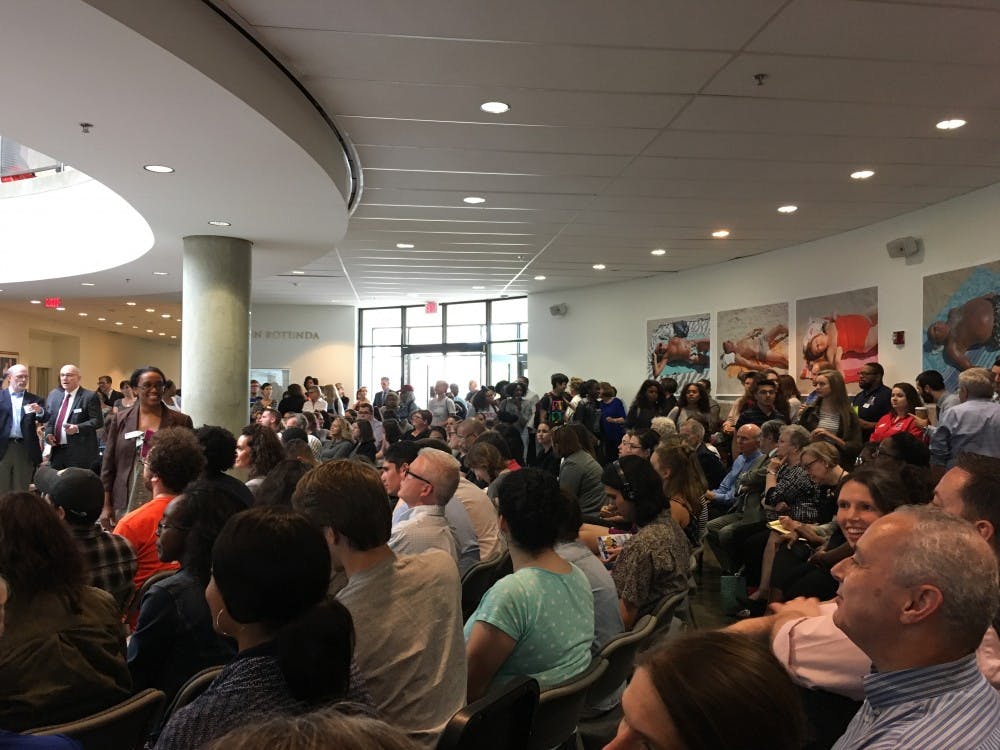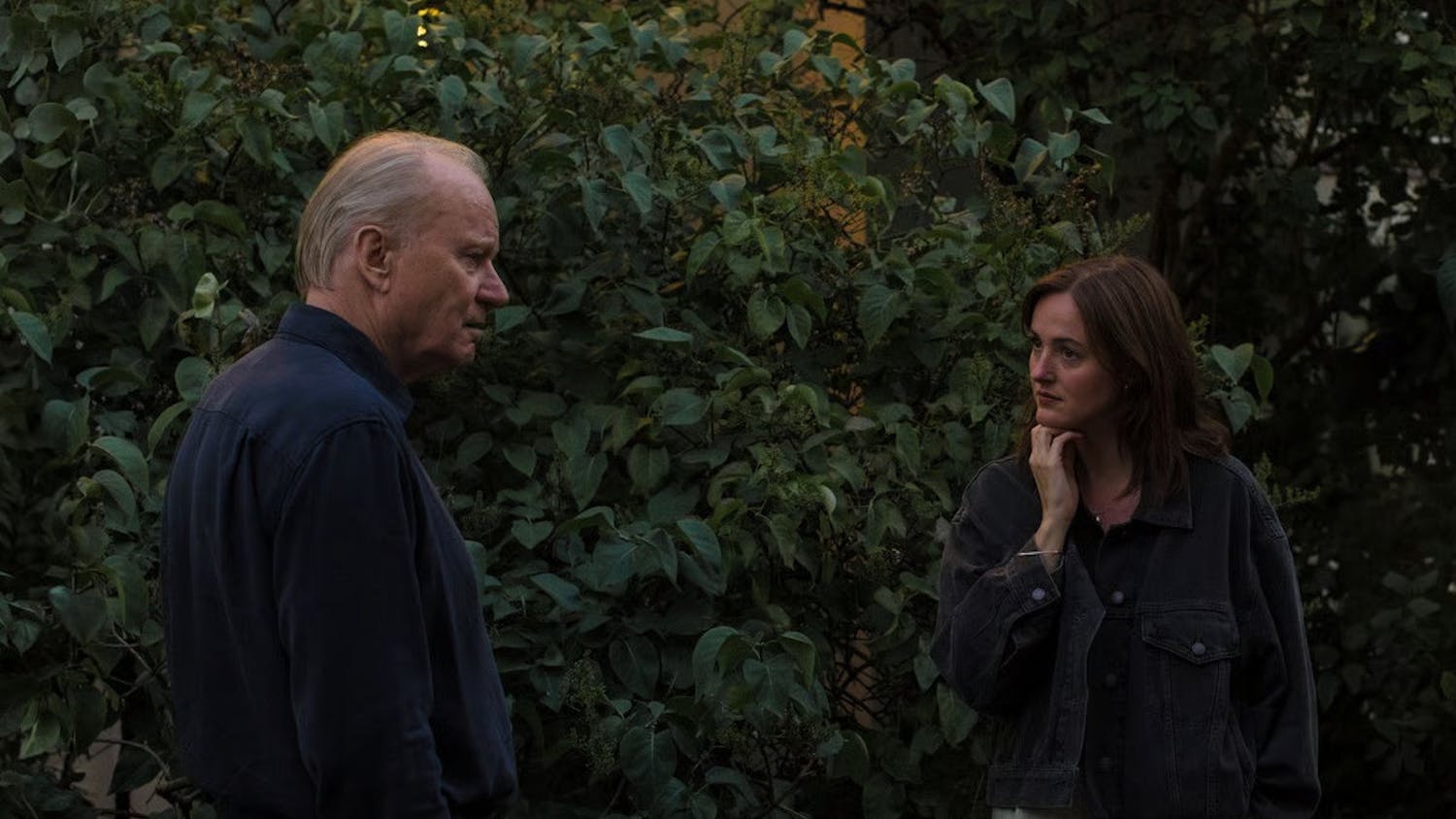AU students, faculty and senior administrators gathered last Tuesday in the Katzen Art Center rotunda for a town hall meeting following student outcry and frustration regarding the University’s handling of racially charged events on campus.
Approximately 150 people gathered for the town hall, which was facilitated by Dr. Fanta Aw, the assistant vice president of campus life and a three time alum of AU. Senior administrators and faculty introduced themselves and their respective administrative oversight before the conversation began.
Vice Provost for Undergraduate Education and AU alum Jessica Waters, introduced the event, underscoring an urgency for the campus community to be united during this time of pain.
“There is deep anger, hurt and betrayal in our community. We need to come to a place from strength,” she said. “If we allow our community to be divided then the very hate we are rallying against today will have won. We have work to do, a lot of work and a lot of very hard work.”
Students raised questions and concerns about issues related to experiences of disrespect and devaluation in the classroom by students and professors, a lack of faculty of color and a white-western focused curriculum. Several students also brought up their frustration with what they said was a weak administrative response to incidents of racism on campus.
Sydney Jones, a sophomore and a Vice President for the NAACP chapter at AU, read a list of demands created by the group during its first general body meeting the previous day. They include:
- Have the administration outline the retribution process for conduct violations and release a statement at every stage of the process.
- Present yearly statistics that document the amount of racially driven discriminatory actions and sexual assaults.
- Mandate race and culture sensitivity training during freshman orientation.
- Conduct “real-life practices not just textbook, paper learning,” In that sense, the offender would have to do community service reflective of their actions.
- Add questions to course evaluations about racial climate in the classroom.
- Give victims the option to discuss the incident with the offender in a safe, non-combative setting.
- Maintain the same financial aid allocation for students throughout their time at AU.
- Evaluate an individual’s commitment to diversity and inclusion when considering possible candidates for the next University president.
Classroom curriculum
Emem Obot, a junior and student leader in The Darkening, called for a re-evaluation and rebooting of the courses provided at the University.
“There is no reason students taking criminal justice classes should be told that the high incarceration of black folks is too political to touch on in class,” Obot said. “I think we need to do a serious reboot of our education. We need to look at it more critically, make sure it is more evident and reflective of our student body. If our education is only through a white western lens, than how are you really reflecting anyone around you?”
Dean of the School of International Service James Goldgeiger responded to critiques of the programming and courses available at the schools and expressed their commitment to develop and diversify course offerings.
Five years ago SIS divided its regional focus into Western and Non-Western studies, according to Goldgeiger. The school has since then expanded to cover more global perspectives.
“We eliminated that and tried to move to a more global perspective, but if you are feeling we still represent too much of a white, western-centric approach, we will look at curriculum and course offerings,” Goldgeiger said.
Faculty diversity
Taylor Dumpson, a junior in the School of Public Affairs, expressed concern that many classes lacked discussions about race and that the school lacked full time faculty of color.
“In the School of Public Affairs, there is currently no full-time faculty of color teaching me anything about criminology,” Dumpson said. “It shouldn’t take me until my junior year to even have conversations about race in my classes.”
Dean of SPA Barbara Romzeck explained that the school is actively searching to hire more faculty of color, though she noted that there is significant demand for faculty members of color in universities across the nation.
“We are actively looking to hire faculty of color. We can’t guarantee the process will work because they [faculty of color] are in high demand,” Romzeck said. “Our hearts our in it, and so are our dollars.”
Dean of Academic Affairs and Senior Vice Provost Mary Clark, who is also the top authority on hiring faculty, responded to the concerns over hiring a greater diversity of professors..
“I am very aware of the need to diversify our faculty for any number of reasons, but most importantly to show who is valued, what ideas are valued, how our students learn best in the classroom, to reflect the diversity of our student body,” Clark said. “That is something we have been working on and continue to work on and welcome your input.”
Moving forward
Freshman Janae Hatcher spoke about the need for university administrators to respond to issues quickly.
“What are you going to do when this meeting concludes? If this meeting proves to just be a way to save face under all of this pressure of all the negative press that this university has received, then you have an even greater problem at your hands,” Hatcher said. “We must do better by our black students and we must do it together.”
Several administrators expressed openness to student feedback and encouraged students to contact them with their concerns. Vice President for Campus Life Gail Hanson and Provost Scott Bass responded directly to demands made in the town hall.
“We can look into financial aid stability, we can look into the reboot of education in terms of how the curriculum process takes place on campus within all of the schools and college,” Bass said. “In terms of diversity and inclusion, more than one requirement will be needed for the undergraduate experience. In terms of faculty, that is an ongoing dialogue.”
Hanson said she and her colleagues will find ways to respond to tracking and communicating the disciplinary process, to report and be transparent about statistics on racially driven discriminatory actions and sexual assaults. Administrators will also look to implement community restitution in student conduct and provide the options for victims to speak with perpetrators during student conduct process, Hanson said.
“[Conversations between victims and perpetrators] takes courage on both parts,” Hanson said. “The sanctions have to be imposed but talking it out and understanding the harm you have done can only happen in that interpersonal exchange. We can start now.”
Toward the end of the town hall, Dr. Aw reminded administrators, faculty and students that clear and concrete actions were critical in moving forward and repairing the community.
“We have heard from our students — it is not just what happens today, it is what happens tomorrow and the day after and the months after, that is going to help people regain the trust in our institution.”





